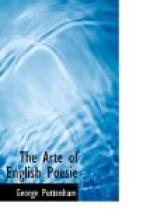CHAP. XXVII.
The manner of Poesie by which they uttered their bitter taunts, and priuy nips, or witty scoffes and other merry conceits.
Bvt all the world could not keepe, nor any ciuill
ordinance to the contrary so preuaile, but that men
would and must needs vtter their splenes in all ordinarie
matters also: or else it seemed their bowels
would burst, therefore the poet deuised a prety fashioned
poeme short and sweete (as we are wont to say) and
called it Epigramma in which euery mery conceited
man might without any long studie or tedious ambage,
make his frend sport, and anger his foe, and giue
a prettie nip, or shew a sharpe conceit in few verses:
for this Epigramme is but an inscription or
writting made as it were vpon a table, or in a windowe,
or vpon the wall or mantel of a chimney in some place
of common resort, where it was allowed euery man might
come, or be sitting to chat and prate, as now in our
tauernes and common tabling houses, where many merry
heades meete, and scrible with ynke with chalke, or
with a cole such matters as they would euery man should
know, & descant vpon. Afterward the same came
to be put in paper and in bookes, and vsed as ordinarie
missiues, some of frendship, some of defiaunce, or
as other messages of mirth: Martiall was
the cheife of this skil among the Latines, & at ahese
days the best Epigrames we finde, & of the sharpest
conceit are those that haue bene gathered among the
reliques of the two muet Satyres in Rome, Pasquill
and Marphorir, which in time of Sede vacante,
when merry conceited men listed to gibe & iest at
the dead Pope, or any of his Cardinales, they fastened
them vpon those Images which now lie in the open streets,
and were tollerated, but after that terme expired
they were inhibited againe. These inscriptions
or Epigrammes at their beginning had no certaine author
that would auouch them, some for feare of blame, if
they were ouer saucy or sharpe, others for modestie
of the writer as was that disticke of Virgil
which he set vpon the pallace gate of the emperour
Augustus, which I will recite for the breifnes
and quicknes of it, & also for another euente that
fell out vpon the matter worthy to be remembred.
These were the verses.
Nocte pluit tota, redeunt spectacula
mane
Diuisum imperium cum Ioue Caesar habet.
Which I haue thus Englished,
It raines all night, early the shewes
returne
God and Caesar, do raigne and rule by
turne.




